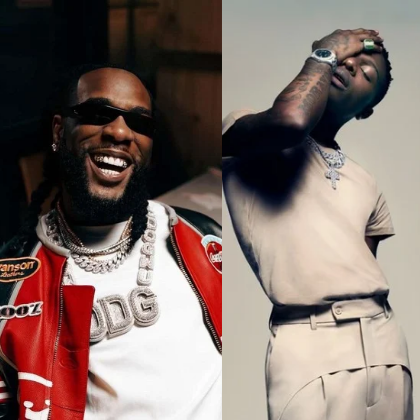Afrobeats, the rhythmic fusion of African melodies with hip-hop, dancehall, and highlife influences, has become one of the world’s fastest-growing music genres. From Lagos to London, and now dominating global charts, the genre is no longer local—it’s a movement. At the centre of this cultural takeover are two Nigerian heavyweights: Wizkid and Burna Boy. But who really runs the genre? Who runs afrobeat in global dominance, cultural impact, and artistry? Let’s break it down.
The Origins and Early Careers of Wizkid and Burna Boy
Wizkid, born Ayodeji Ibrahim Balogun, burst onto the scene with the smash hit “Holla at Your Boy” in 2010 under Banky W’s EME label. He quickly became a fan favorite, thanks to his smooth vocals and infectious hooks. His debut album Superstar lived up to its name, solidifying him as the poster boy of Afrobeats in the early 2010s.
Burna Boy, born Damini Ebunoluwa Ogulu, took a different route. With deep musical roots (his grandfather once managed Fela Kuti), Burna started out with Like to Party in 2012. But it wasn’t until his 2018 album Outside and the Grammy-nominated African Giant that the world really stood up to notice his unique Afro-fusion style—a blend of reggae, dancehall, and Afrobeats.
Musical Style and Artistic Evolution
Wizkid is known for his laid-back, melodic vibe. His music leans toward love, lifestyle, and rhythm—easy listening that crosses borders. Over the years, his sound evolved from raw Afrobeats to a more refined global pop fusion. Songs like Essence featuring Tems captured both the streets and the Billboard charts, becoming an anthem worldwide.
Burna Boy, on the other hand, wears his political and cultural awareness on his sleeve. His songs are layered with meaning, often addressing colonialism, African identity, and the struggles of black people worldwide. His voice is raw, his lyrics intentional. Albums like Twice As Tall and Love, Damini aren’t just music—they’re statements.
Discography and Notable Projects
Wizkid’s catalog is filled with bangers. From Ojuelegba, which earned praise from Drake and Skepta, to Come Closer and the Grammy-nominated Made in Lagos, his music consistently delivers. The Made in Lagos album alone became a global sensation, earning multi-platinum status and elevating Afrobeats into mainstream playlists.
Burna Boy’s African Giant was a turning point not just for him but for the genre. It earned him a Grammy nomination and turned heads worldwide. He followed that up with Twice As Tall, which finally earned him a Grammy win for Best Global Music Album. His consistency in pushing thematic albums sets him apart.
Global Recognition and Awards
Wizkid made history by becoming the first Nigerian artist to top the US Billboard Hot 100 as a featured act on Drake’s One Dance. He’s also snagged a Grammy for Brown Skin Girl with Beyoncé and has sold out arenas like the O2 in London multiple times. His crossover appeal is undeniable.
Burna Boy, meanwhile, is the first Nigerian solo artist to win a Grammy in a major category for his own album. He’s performed at the Grammys, been on The Daily Show, The Tonight Show, and sold out Madison Square Garden—a feat few African artists have achieved. His recognition goes beyond music—he’s a symbol of African excellence.
Cultural Impact and Influence
Wizkid represents finesse and mainstream success. He’s often credited with making Afrobeats globally palatable. His influence spans fashion, branding, and youth culture. He’s also paved the way for newer artists like Rema and Tems, proving he’s not just a star, but a trendsetter.
Burna Boy, however, represents resistance and African pride. He’s bolder in messaging and unapologetic in delivery. His activism, whether subtle or loud, resonates with a generation of Africans seeking identity and representation on the global stage. He’s not just making music—he’s reshaping the African narrative.
Collaborations and Crossovers
Wizkid has worked with global icons like Drake, Beyoncé, Skepta, Justin Bieber, and Chris Brown. These collaborations boosted not just his profile but the genre’s footprint across continents.
Burna Boy isn’t far behind. He’s featured on tracks with Stormzy, Ed Sheeran, Sam Smith, and Justin Bieber as well. His inclusion in major festivals and global platforms proves he’s equally influential.
Who Really Runs Afrobeats?
So, who runs it?
If we’re talking about commercial success, streaming numbers, and mainstream appeal—Wizkid holds the crown. He’s the smoother operator, the bridge between African beats and Western pop.
But if we’re discussing artistry, depth, and cultural significance—Burna Boy takes the throne. His music speaks louder, his message hits harder, and his Grammy win proves he’s not just hot—he’s historic.
Truthfully, Afrobeats is big enough for both. While Wizkid keeps the party going, Burna Boy keeps the fire burning. They’re two sides of the same coin, and their friendly rivalry only makes the genre richer.
Conclusion
Wizkid and Burna Boy have taken Afrobeats to unimaginable heights. Each in his own right is a king of the genre—Wizkid with his global hits and cool charisma; Burna Boy with his fiery messages and musical activism. Whether you vibe more with Essence or Anybody, one thing is clear: Afrobeats is in good hands. Now truthfully answer this question; Who runs Afrobeat?
FAQs
1. Who has more international awards: Wizkid or Burna Boy?
Burna Boy has a Grammy for Twice As Tall, while Wizkid has a Grammy for his collaboration on Brown Skin Girl. Both are highly awarded internationally, though Burna’s Grammy for his solo album gives him an edge.
2. Who is more commercially successful?
Wizkid generally has more chart-topping singles and global pop appeal, especially with tracks like Essence and One Dance.
3. Who influences Afrobeats more musically?
Burna Boy’s music is often deeper and more genre-bending, influencing the direction of Afro-fusion. Wizkid sets trends in sound and style.
4. Have they ever collaborated?
Yes, they’ve worked together on tracks like Ginger, combining both of their unique styles into hit records.
5. Can both be considered kings of Afrobeats?
Absolutely. They represent different strengths, and together, they’ve helped shape and globalize Afrobeats like never before.




